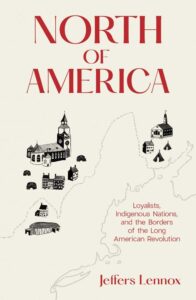North of America – Jeffers Lennox
 North of America: Loyalists, Indigenous Nations, and the Borders of the Long American Revolution. By Jeffers Lennox. (New Haven: Yale University Press, 2022. 378 pp. Cloth, $30.00.)
North of America: Loyalists, Indigenous Nations, and the Borders of the Long American Revolution. By Jeffers Lennox. (New Haven: Yale University Press, 2022. 378 pp. Cloth, $30.00.)
Despite being our neighbor to the north, Jeffers Lennox believes that Canada’s presence and role in the American Revolution and the founding of the American nation has been overlooked. From before the Revolution to the end of the War of 1812, the desire to incorporate Canada into the emerging United States (prior to the Revolution, and through the grey area of the Articles of Confederation, which Lennox refers to as the “united States,” to the early Republic to western exploration to the War of 1812) remained an important goal for American policymakers.
In North of America, policymakers play the main role in demonstrating the pervasiveness of the desire to annex Canada. Because Lennox believes the story of Canadian incorporation is a novel one, he starts at the very top, so this is a history of great men. I think this approach is fine for now, but I would definitely be interested in a sequel that deals with the relationship between Canada and America on the ground, and in the role this relationship played in culture. How did Americans who lived across the often contested border from friends and relatives view to what Lennox portrays as an indefatigable desire to incorporate Canada into the United States. What kind of propaganda did they imbibe and react to? What newspapers did they read and write? How did they feel about their respective governments? How did they view the role of Indigenous peoples in the defense of Canada – and how did they respond to interracial violence? How did the “ordinary” Americans view Canada?
My other point of contention is the lack of discussion about the role of slavery. It is mentioned several times in passing but I do not think it gets the attention is deserves. Lennox does not, for example, explore the debate that would surely have occurred in Congress should the increasingly abolitionist provinces of Canada be incorporated into the Union. There are few dissenting American voices in this book, and nearly no southern ones (besides the views of presidents presented more as federal representatives than southerners). I would find it odd if no lengthy debates occurred in Congress about upsetting the balance of powers by admitting new Canadian territory into the United States. Sadly, Lennox’s omission of these debates lead us to believe they didn’t occur, which I find hard to believe. I will also point out here that this is a northern history – the voices of Southerners on anything, not just including race, are mostly silent. This seems like and oversight to me.
Lennox set out to prove that Canada played an important role in the founding and building of the new nation of the United States, and I think he does this. But it is far from a complete picture and begs other scholars to flesh out Lennox’s arguments, or contradict them. This is an important book, but its topic has the promise to be much more.
